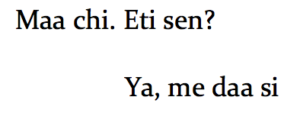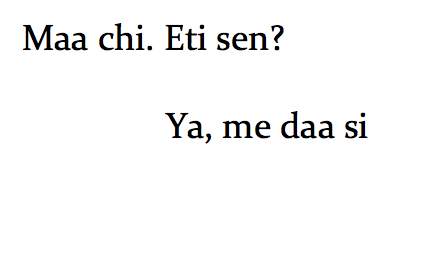
Next school year, Capital will be offering classes in Twi, an African language native to Ghana.
One of the thousands of languages to come out of Africa, Twi is a majority language in Ghana and is spoken commonly throughout West Africa. An estimated 85% of Ghana’s populations speaks Twi.
Instrumental in the decision to offer Twi was Language and Cultures Department chair Maria Jose Delgado. With support from the university, she was able to get a program started.
Although the Twi class is only a pilot, Delgado is optimistic about its outcome. In the past, languages such as Japanese and Cantonese went through similar test runs, but failed and died out due to lack of interest from the student body.
Unlike these past pilot courses, there has been a strong push from the students to offer an African language. Twi was chosen not only because of the demand from students, but because of the growing African demographic in the Columbus area.
“We have a lot of people here in Columbus from Ghana,” said Professor Delgado, “There’s nothing like hearing … a welcome, a goodbye, a ‘how are you?’… in your own language.”
Another reason why Twi was chosen as a pilot language was because of the accessibility of a teacher. Professor Lorinda Nutor, who is a native of Ghana, will be teaching the courses.
“It’s best when it comes from a native that knows exactly about the culture, that knows exactly about the nuances of languages,” said Delgado. “There’s nothing like a native speaker.”
Delgado went on to talk about the cultural aspect of learning a language, and how important it is to be able to make the connection between a foreign language and a new culture, especially in the introductory levels of the course.
“[It is] one thing … to learn the language, but another is to understand humor, how to behave … how to address someone,” said Delgado. “How do we address older people? How do we address our peers?… What kind of holidays do we celebrate?”
In addition to Twi, Delgado notes that students have expressed a strong desire for Arabic. If Arabic were to be offered, it would begin in the same fashion as Twi is beginning next year.
As of right now, it is unclear whether or not Twi will take off. Delgado reports that the couple of students that have signed up for the classes despite conflicts with other courses. She believes that some of them may wait until spring.
Overall, Professor Delgado is optimistic and seems eager to present this new venture as a great leaning opportunity.
“If we see the support… we will offer other languages. We like our students to be globally attentive … Culture is really embedded in the language and language is very much embedded in the culture.”

